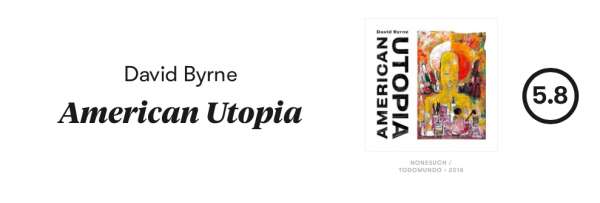Pitchfork: David Byrne - American Utopia Album Review
Via Pitchfork

Written by Evan Rytlewski
For legacy musicians in their late-career phrase, there’s a common track to follow. Maybe it’s an album that incentivizes low risk/low reward, a real back-to-basics outing, or a tasteful covers collection followed by some meditations on aging that lead to predetermined takeaways, that sort of thing. But so long as they’re willing to settle for good-enough, everybody wins: The artist keeps creating, Rolling Stone tosses them an extra star as a thank you for their service, and fans get a chance to hear the old hits on tour.
David Byrne isn’t playing along. Rather than subtly downplaying expectations for his latest project, he’s actively drummed them by billing American Utopia as his first solo album in 14 years (technically true, but he’s made plenty of collaborative albums in the interim). More dramatically, he announced it in conjunction with a huge tour behind what he’s called “the most ambitious show I’ve done since the shows that were filmed for Stop Making Sense.” He’s all but daring audiences to compare American Utopia to his Talking Heads heyday, a comparison that doesn’t flatter even his best solo albums—and American Utopia, to be clear, is not one of his best albums. Nonetheless, with his latest, Byrne does what so few of his peers will: He takes some actual risks.
It’s hard to determine how much goodwill that affords him. Beyond American Utopia’s rictus optimism—Byrne’s method of pushing back against the cynical politics of the moment—the album has plenty to commend: It’s bright, daring, and open-hearted, the work of an artist who has thrown himself into his work absolutely. Yet, almost as often, it’s clumsy or gaudy, if not outright grating. It takes less than a minute to realize you’re in store for a rough ride, when the swooning, mannerly “I Dance Like This” is upended by a robotic breakdown—a throwback to a very 1980s notion of coolness that scans as hopelessly dated today.
That’s just the first of American Utopia’s many losing gambits. Byrne has often flirted with silliness as an aesthetic, but the wonky sound effects on “It’s Not Dark Up Here” cross the line into brazen dopiness. Even less tasteful than his indiscriminate knob-twisting is his wordplay. “The brain of a chicken and the dick of a donkey,” Byrne croons on “Every Day Is a Miracle,” a potentially infectious Caribbean party-starter that’s undone by one lyrical face-plant after another. “The pope don’t mean shit to a dog,” he observes on that same song (which, amazingly, is immediately followed by another song about the cognitive limitations of a dog). Despite his reputation as one of rock’s great thinkers, Byrne has never sounded more like a stoned teenager staring at the clouds and spit-balling deep thoughts about the universe.
And yet despite its many misfires—including a truly unfortunate pun on the word “duty” in that dog song—American Utopia manages two unblemished triumphs in its final stretch. “Doing the Right Thing” builds from a twitchy tempo and suave string accompaniment to the album’s greatest thrill, a surprise blast of proggy synths that completely eviscerates the song, a musical ambush on par with Jerry Harrison’s extraterrestrial keyboard abduction on “Stay Hungry” four decades ago. Even better is “Everybody’s Coming to My House,” an absolute jam and Byrne’s sharpest satire of the suburban dream since “Once in a Lifetime.” Here, everything that might have blown up in his face elsewhere on the album pays off beautifully: the overheated post-punk guitars, feverish art-rock horns, and wily drum breaks. He even pulls off a dubby breakdown. These are the kinds of highs a master can achieve when they rediscover a moment of unknown inspiration. It’s just a shame they’re tucked away on an album that’s otherwise littered with cautionary tales.